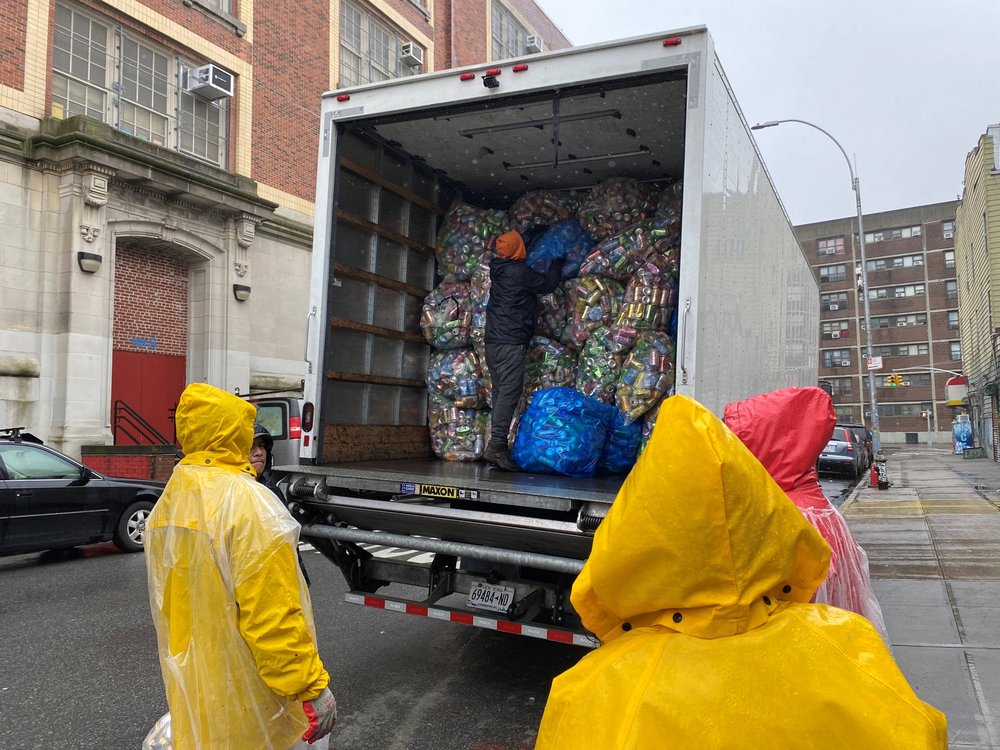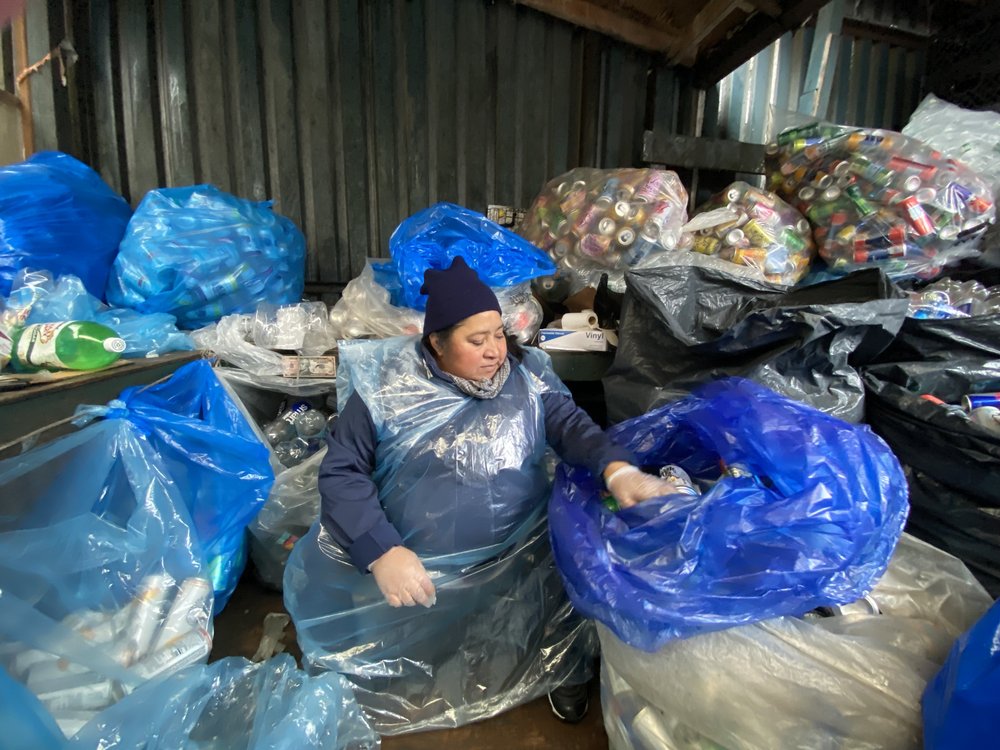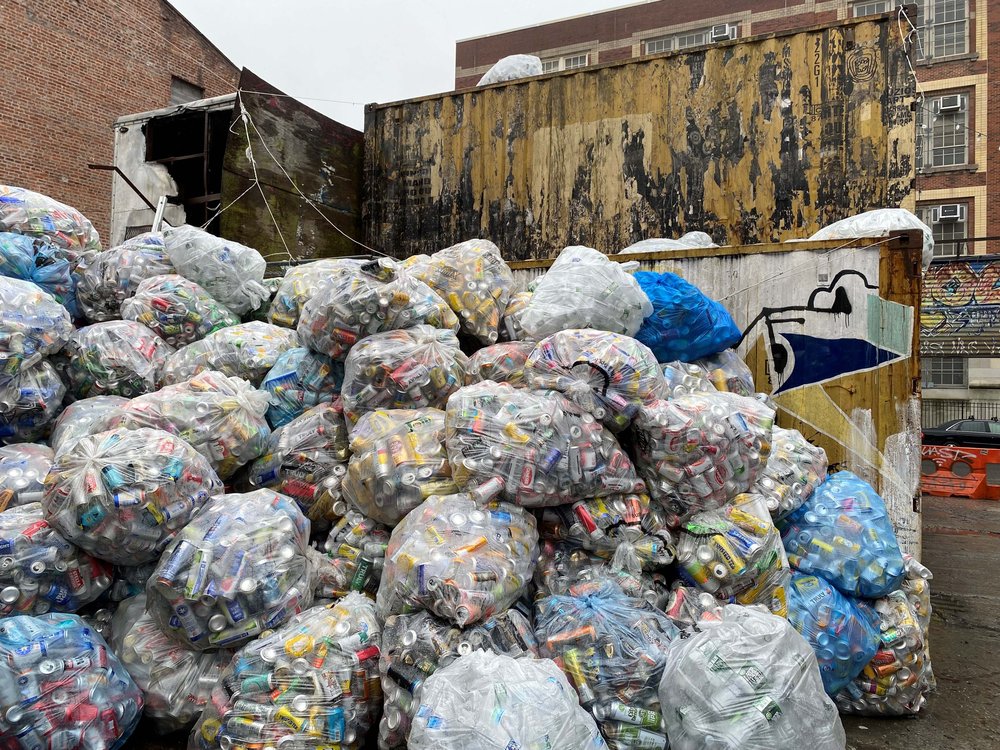As more people turn to collecting bottles and cans, NY lawmakers push doubling refunds
March 8, 2024, 6:01 a.m.
The city’s self-employed recyclers want the state to pass a bill to boost their earnings.

The workers who collect empty bottles and cans from the city's streets and trash bins want state lawmakers to double the refunds they get from recycling containers from 5 cents to 10 cents, which would be the first boost in 40 years.
The independent recyclers — known as canners or lateros in Spanish — say the COVID-19 pandemic and the arrival of new migrants increased competition among can collectors as workers struggle with finding steady jobs and grapple with rising rents, food prices and evictions.
A new report released last week found canners earn an average of $5 an hour — a third of the city’s minimum wage — and nearly half are between 50 and 65 years old.
“Every year that goes by, the cost of living goes up and the deposit doesn't change,” said Ryan Castalia, executive director of the nonprofit Sure We Can, which advocates for canners and commissioned the report.
The report surveyed about 250 canners and found more than 60% were immigrants, 86% were housed and most were renters. Three-quarters of canners said they spent their earnings on food. Estimates from 2019 calculated there were between 4,000 and 8,000 can collectors in the city, but those numbers are now likely higher as workers continue to recover from job losses during the pandemic.
The state bill, sponsored by Democratic Assemblymember Deborah Glick of Manhattan, would increase the recycling refund rate and would expand the list of redeemable containers to include wine bottles, juice boxes and tea beverages.
“When I was growing up in Queens, we had milk delivered in bottles," she told Gothamist. "You used them and then you put the empties back in the little insulated aluminum box outside, and they picked them up, took them back, sanitized them and reused them. So we knew how to do this stuff — we've just had a revolution of laziness."

Glick pointed to the global plastic problem and added that "landfills are filling up, and we have to move towards a reuse-and-refill economy."
Certain beverage containers can be redeemed for a nickel at stores, reverse-vending machines like those found outside supermarkets, or large warehouse-style redemption centers.
Canner Josefa Marin, 54, said the bill would benefit workers like her as well as all New Yorkers. She said she's worked as an independent recycler for 20 years and relies on canning to pay her rent and bills.

“Imagine, we would clean so much better, we would leave everything cleaner, a lot more wouldn’t go to waste and it would be better for the environment,” Marin said in Spanish. “If they help us, we help them to clear litter from the streets and keep our city clean, our parks clean. But if they don’t make more containers eligible, we can’t pick them up.”
But Michael Correra, executive director of the Metropolitan Package Store Association, which represents about 4,000 liquor stores in the state, said the bill would hurt store owners who don’t have space to store empty bottles until distributors or recyclers can pick them up. He said store owners also worry about roaches and bugs getting into the empty containers.
“We're pro-environment, and we think it's a great conversation, but it cannot be on the backs of small businesses like us,” Correra said. “You go in Times Square and you see a 400-square-foot store, and there's no shot that they have a space to put empty bottles for two weeks until somebody comes and picks them up.”
New York first began requiring a 5 cent deposit on certain beverage containers in the early 1980s. It opened up avenues of income for people who struggled to obtain more traditional jobs due to language barriers, physical disabilities, mental illness, age or immigration status, said Castalia of Sure We Can.
He said canners keep the city’s streets clean — reducing litter by 70% — and are crucial to the recycling ecosystem.

“This material is highly sorted, really carefully sorted, really materially consistent, and all the materials are separated really well," he said. "It means it's just much, much more likely to be a viable recycled product."
Under the state bill, the deposit would boost revenues for redemption centers, or locations that take bottles from canners and return them to beverage distributors. Reimbursements would go up from 3.5 cents per container to 6 cents.
The report released last week found 50% of redemption centers, which tend to be small businesses, have closed since 2008. Castalia, who runs a redemption center in Williamsburg that operates as a nonprofit, said there are no redemption centers left in Manhattan.
“If the law doesn't change and the costs of operating go up, it becomes harder and harder to operate a redemption center because they can't adjust their profit margin,” he said. “There's this really crummy situation where redemption centers are closing all over the state because they just can't afford to exist.”
While some canners work during their spare time to collect extra cash, others work around the clock and rely solely on canning for income.
Pedro Romero said he used to look down on this work but now sees it as a business.
“It’s work just like any other, like in a deli or a pizzeria,” he said in Spanish. But, he added, “we’re our own bosses of our business.”
NYC's compost collection program expands to Brooklyn Inside The World Of NYC 'Canners' Who Survive By Collecting Recyclable Cans & Bottles